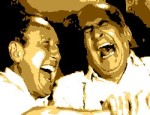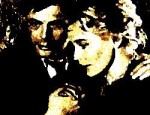Film Review
On the face of it,
Cette nuit-là resembles a fairly routine
thriller of the 1950s. The plot (taken from a novel by Michel Lebrun
entitled
Un silence de mort) is one you'd expect to find in any potboiler
crime movie of this era, with twists and turns that (for anyone familiar
with the genre) are all pretty predictable. What sets the film apart
is the sheer economy of its mise-en-scène and how effectively its
director Maurice Cazeneuve (aided by some top-notch performances from a fine
principal cast) manages to eke every last drop of tension from the fairly
formulaic narrative.
This was the first and only film that Cazeneuve made for the cinema - astonishing
when you consider the promise he shows in this masterfully crafted debut
work. Cazeneuve started out as an assistant to Marcel Carné
on the aborted
La Fleur de l'âge before making his move to French
television, where he spent the bulk of his career. From the opening
shot - which looks like a cheeky homage to the famous 'reveal' in
To Catch a Thief (1955)
- Cazeneuve looks as if he is taking his cue from Alfred Hitchcock, and if
there is one word that best describes
Cette nuit-là it is
Hitchcockian.
The small cast of characters trapped in a deadly game of fear, deceit and
manipulation, the slow ratcheting up of the tension to a supremely dramatic
climax, the spell-binding performances that grab our attention and never
let go for a second - these are the defining features of Hitchcock's oeuvre
that Cazeneuve masterfully replicates and - in a few memorable scenes - slightly
improves upon.
Much of the film's hypnotic power is owed to Léonce-Henri Burel's
eerily atmospheric photography, which gives the film a distinctive film noir
feel very different to what you would find in most French thrillers of this
time. One of the most gifted of cinema's cinematographers, Burel
started out in the silent era, adding in no small measure to the genius of
Abel Gance's
Napoléon
(1927), and ended by helping to define Robert Bresson's unique visual style
on such films as
Un condamné
à mort s'est échappé (1956). After this
exemplary effort, Burel would lend his talents to another seductively noirish
thriller, Julien Duvivier's
Chair
de poule (1963). With such strongly expressive visuals,
Cette
nuit-là hardly needs a score to accompany it, and it is interesting
how little music there is - indeed, the absence of music is one of the reasons
why the film is so unbearably tense.
As befits a quality B-movie,
Cette nuit-là does not boast a
big name star but instead three highly talented near-stars, who provide just
as much value with more in the way of copper-bottomed authenticity.
Mylène Demongeot's career was very much on the up following her appearance
in Otto Preminger's
Bonjour Tristesse (1958), although her career
petered out in the late '60s and she never quite achieved the stardom that
was due to her. Jean Servais's career stretched back to the 1930s but
was virtually over by the early 1950s - Jules Dassin came to his rescue by
giving him the role for which he is now best remembered in the iconic thriller
Du rififi chez les hommes
(1955). Although highly regarded, Maurice Ronet would spend most of
his career in the shadow of more charismatic and better promoted actors like
Alain Delon. His premature death at the age of 55 has added to his
unjustly low profile outside France.
Servais, Ronet and Demongeot were not as well-served by cinema as their talents
merited, and this is evident throughout
Cette nuit-là, a film
which plays to each of their strengths and leaves us begging for more.
Here are three characters that are all too easy to engage with - a cruel
publishing magnate who thinks he can take anything he wants (sounds familiar?),
a neurotic lackey who, obsessed with gaining control over his life, ends
up laying his own path to Hell, and the ambiguous femme fatale caught in
the middle of a dangerous game of domination and submission. The script
may not be much to write home about, but the film's three lead actors bring
an astonishing depth and reality to their performances - and ultimately this
is what makes
Cette nuit-là one of the most nerve-racking French
thrillers you will ever see.
© James Travers 2016
The above content is owned by frenchfilms.org and must not be copied.
Film Synopsis
Jean Maillet and his dazzlingly photogenic wife Sylvie both work for a publishing
house owned by Monsieur Reverdy, a ruthless businessman who is used to getting
what he wants. Maillet is the designer on one of Reverdy's glossier
magazines, for which his wife is the principal model. When Reverdy
begins to take an interest in Sylvie and shows signs of wanting to take her
away from him, Jean becomes consumed with jealousy and contemplates murdering
his employer. Late one night, Jean sees a man leaving Reverdy's bachelor
pad and, mistaking him for his rival, smashes his head with the handle of
his revolver. Realising that he has killed the wrong man, Jean flees
in a panic, not yet knowing that he has left the keys to his car and the
murder weapon at the scene of the crime. Anxious hours follow as Jean
and Sylvie wait for the police to turn up at their apartment with an arrest
warrant - but no one does show up. There is no account of the murder
in the newspapers and it seems that the crime has yet to be discovered.
Then Jean receives a letter from a stranger who insists on seeing him.
It seems that someone witnessed the murder and intends blackmailing Jean.
But are thing really what they seem...?
© James Travers
The above content is owned by frenchfilms.org and must not be copied.



